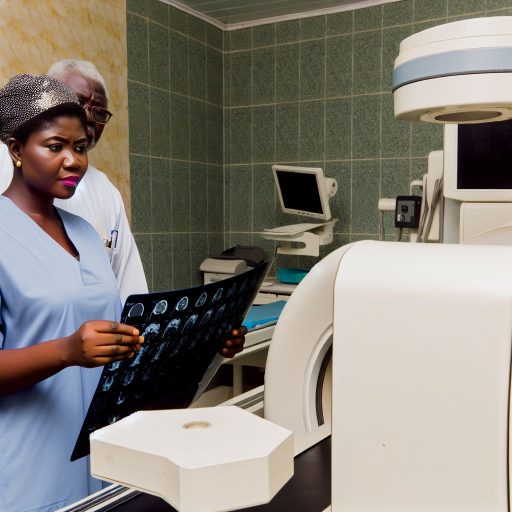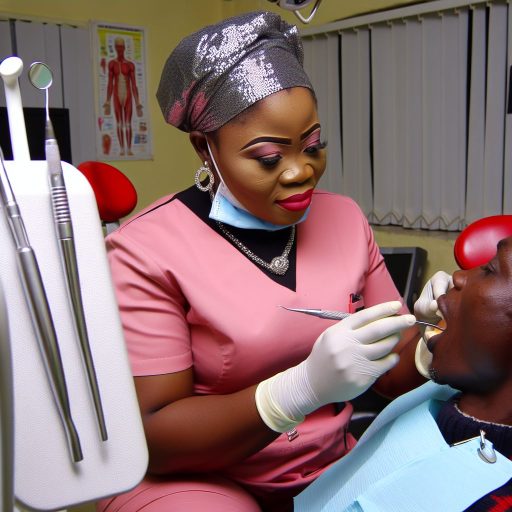Introduction:
Anesthesia plays a crucial role in oral surgery, ensuring patient comfort and safety throughout the procedure.
In Nigeria, practices surrounding anesthesia in oral surgeries vary widely.
Anesthesia in Oral Surgery: Nigerian Practices
Types of anesthesia commonly used in oral surgery in Nigeria:
Local anesthesia: The most common type used in dental procedures for numbing specific areas.
General anesthesia: Used for more complex procedures or for patients with fear or anxiety.
Sedation: Administered to relax patients during minor oral surgeries or procedures.
Local Anesthesia
Local anesthesia is commonly used in oral surgery in Nigeria due to its effectiveness.
It involves injecting numbing medication into specific areas of the mouth to block pain.
Dentists often use local anesthesia for procedures like fillings, extractions, or root canals.
This type of anesthesia allows patients to remain awake during the surgery.
The effects wear off within a few hours, allowing for a quick recovery after the procedure.
Local anesthesia is considered safe and has minimal risks when administered by a professional.
General Anesthesia
General anesthesia is used in more complex oral surgeries where the patient needs to be unconscious.
This type of anesthesia is administered intravenously to induce a state of total unconsciousness.
Dentists may recommend general anesthesia for extensive surgeries such as jaw reconstruction or oral cancer treatment.
It requires careful monitoring of vital signs and airway management throughout the procedure.
General anesthesia provides complete pain relief and allows for the patient to have no recollection of the surgery.
There are risks associated with general anesthesia, so patients need to be screened thoroughly before it is used.
Sedation
Sedation is a milder form of anesthesia that helps patients relax during oral surgeries.
It is often used for patients with mild anxiety or fear of dental procedures.
Sedative medications can be administered orally, intravenously, or through inhalation.
Patients remain conscious but are in a state of deep relaxation and reduced awareness.
Sedation is commonly used for procedures like tooth extractions, gum surgeries, or dental implants.
It is important for patients to follow pre-sedation instructions and have a responsible caregiver to accompany them.
The use of anesthesia in oral surgery in Nigeria is essential for providing a pain-free and comfortable experience for patients.
Dentists carefully assess each patient’s needs before determining the appropriate type of anesthesia to use.
Local anesthesia, general anesthesia, and sedation each have their benefits and risks.
It is crucial for patients to be well-informed before undergoing any oral surgery procedure.
By following proper protocols and guidelines, dental professionals in Nigeria can ensure the safety and well-being of their patients during anesthesia administration.
Administering Anesthesia in Oral Surgery in Nigeria
Administering anesthesia in oral surgery in Nigeria comes with several challenges that need to be addressed.
Limited Access to Specialized Equipment and Drugs
One of the major challenges faced in anesthesia administration in oral surgery in Nigeria is the limited access to specialized equipment and drugs.
The availability of essential tools and medications is crucial for the safe and effective administration of anesthesia during surgery.
Due to budget constraints and limited resources, many healthcare facilities in Nigeria may not have the necessary equipment and drugs required for anesthesia administration.
This lack of access can pose serious risks to patients undergoing oral surgery and may compromise the overall success of the procedure.
Lack of Trained Anesthesia Professionals
Another significant challenge in administering anesthesia in oral surgery in Nigeria is the lack of trained anesthesia professionals.
Anesthesia administration requires specialized knowledge, skills, and training to ensure the safety and well-being of patients during surgery.
In Nigeria, there is a shortage of qualified anesthesia professionals who are trained to administer anesthesia in oral surgery.
This lack of expertise can result in suboptimal anesthesia delivery, increasing the risk of complications and adverse outcomes for patients undergoing oral surgery procedures.
Cost Implications for Patients
Cost is a major factor that influences the administration of anesthesia in oral surgery in Nigeria.
Anesthesia services can be expensive, and many patients may face financial barriers to accessing quality anesthesia care during oral surgery procedures.
Transform Your Career with Expert Guidance
Get personalized mentorship consulting that’s tailored to your unique path. Our expert advice is actionable and exclusive.
Get StartedFor some patients, the cost of anesthesia services may be prohibitive, leading to delayed or substandard care.
This can result in increased risks during surgery and may impact the overall success of the procedure.
Addressing the cost implications for patients is essential to ensure that all individuals have access to safe and effective anesthesia care during oral surgery.
Addressing the challenges faced in administering anesthesia in oral surgery in Nigeria is essential to improve the quality and safety of dental procedures.
By expanding access to specialized equipment and drugs, training more anesthesia professionals, and addressing cost implications for patients, the dental healthcare system in Nigeria can enhance the delivery of anesthesia services and improve patient outcomes.
Discover More: ENT Surgery and Lifestyle Changes Post-Operation
Cultural beliefs and practices that influence the use of anesthesia in oral surgery in Nigeria:
Nigerian cultural practices often include a fear of anesthesia due to misconceptions about its safety and potential risks.
Many individuals believe that anesthesia can be harmful and prefer to avoid it if possible.
- Fear of anesthesia and its side effects
Traditional medicine holds a significant place in Nigerian culture.
Many people opt for herbal remedies and traditional healers over modern medical practices.
This preference extends to oral surgery, where some individuals may choose traditional methods over anesthesia.
- Preference for traditional medicine over modern anesthesia
In Nigerian society, family plays a crucial role in decision-making processes, including healthcare decisions.
When it comes to anesthesia in oral surgery, family members may influence an individual’s choice.
This sometimes leads to a reluctance to use anesthesia.
- Role of family members in decision-making regarding anesthesia
Discover More: Blood Bank Services and Availability in Nigeria
Advances in Anesthesia Techniques and Technology in Nigerian Oral Surgery:
Introduction of Nerve Blocks for Effective Pain Control:
Nerve blocks have revolutionized pain management in oral surgery.
These techniques provide targeted relief to patients.
Use of Monitoring Devices to Ensure Patient Safety During Surgery:
The integration of monitoring devices has significantly enhanced patient safety.
Devices such as pulse oximeters and ECG machines play a crucial role.
Collaboration with Anesthesia Specialists for Complex Cases:
In complex cases, collaboration with anesthesia specialists ensures optimum care.
This approach enhances safety and quality of care for patients.
See Related Content: Top ENT Hospitals and Clinics in Nigeria

Training and Education Programs for Dental Professionals in Anesthesia in Nigeria:
Proper training in administering anesthesia is crucial for dental professionals in Nigeria.
It ensures safe and effective use of anesthesia during oral surgery procedures.
Dental professionals must undergo specialized training programs to acquire the necessary skills.
Importance of Proper Training in Administering Anesthesia:
Proper training reduces the risk of complications and ensures patient safety.
It allows dental professionals to handle emergency situations effectively during anesthesia administration.
Adequate training also helps in managing pain and anxiety for patients undergoing oral surgery.
Certification Requirements for Dental Professionals:
Dental professionals in Nigeria must obtain certification in anesthesia administration.
This certification ensures that professionals have met the required standards and guidelines.
It serves as evidence of competency and expertise in administering anesthesia for oral surgery.
Continuous Education on Updated Anesthesia Practices:
Dental professionals must engage in continuous education to stay updated on anesthesia practices.
Regular training workshops and seminars help in enhancing skills and knowledge in anesthesia.
It allows professionals to adopt new techniques and advancements in anesthesia administration.
Learn More: Success Stories: Nigerian Biomedical Technologists
Ethical considerations in anesthesia administration for oral surgery in Nigeria:
- Informed consent and patient autonomy
- Duty of care and patient safety
- Legal implications of anesthesia errors
Informed consent and patient autonomy
In the context of anesthesia administration for oral surgery in Nigeria, informed consent plays a crucial role in ensuring ethical practice.
Patients must be adequately informed about the risks, benefits, and alternatives to anesthesia before giving their consent.
This process allows patients to make autonomous decisions regarding their healthcare, taking into account their personal values and preferences.
Duty of care and patient safety
Healthcare practitioners in Nigeria have a duty of care to ensure the safety and well-being of their patients during anesthesia administration for oral surgery.
This involves adhering to professional standards, monitoring patients closely during the procedure, and responding promptly to any complications that may arise.
Patient safety should always be the top priority in any clinical setting.
Legal implications of anesthesia errors
Errors in anesthesia administration during oral surgery can have serious legal implications for healthcare providers in Nigeria.
In cases where patients suffer harm due to anesthesia-related errors, healthcare professionals may be held accountable for negligence or malpractice.
It is essential for practitioners to adhere to best practices and standards of care to minimize the risk of legal repercussions.
Improving Anesthesia Practices in Oral Surgery
Anesthesia plays a crucial role in ensuring the comfort and safety of patients undergoing oral surgery in Nigeria.
This medical practice allows for complex procedures to be performed efficiently and effectively.
It significantly reduces the risk of complications and improves patient outcomes.
There is a need for improvement in anesthesia practices in Nigeria.
Healthcare institutions can enhance practices through a concerted effort to prioritize anesthesia training for dental professionals.
Policymakers and regulatory bodies must work together.
Establishing guidelines and standards for the administration of anesthesia in oral surgery is crucial.
Such steps will ensure that patients receive the highest quality of care.
Practitioners must be equipped with the necessary skills to deliver safe and effective anesthesia services.
Continuous education and training are essential for dental professionals.
Staying current with the latest advancements in anesthesia practices enhances practitioners’ skills.
Investing in training programs and workshops has significant benefits.
These initiatives improve best practices in anesthesia administration.
By prioritizing education and training, we can greatly enhance the quality of care.
Ultimately, our collective responsibility is to ensure that every patient receives safe and effective anesthesia care.
This leads to better outcomes and overall patient satisfaction.
Additional Resources
Physician burnout in Nigeria: a multicentre, cross-sectional study …
A Pathology Trailblazer’s Journey from Nigeria to the Bronx: Q&A …




